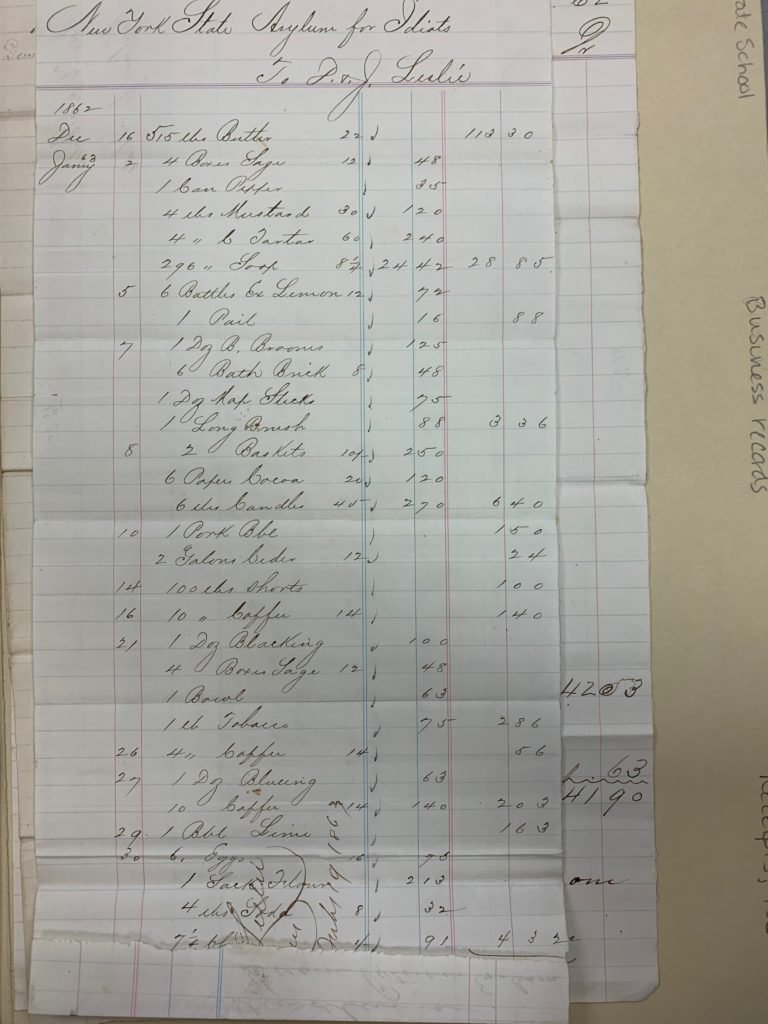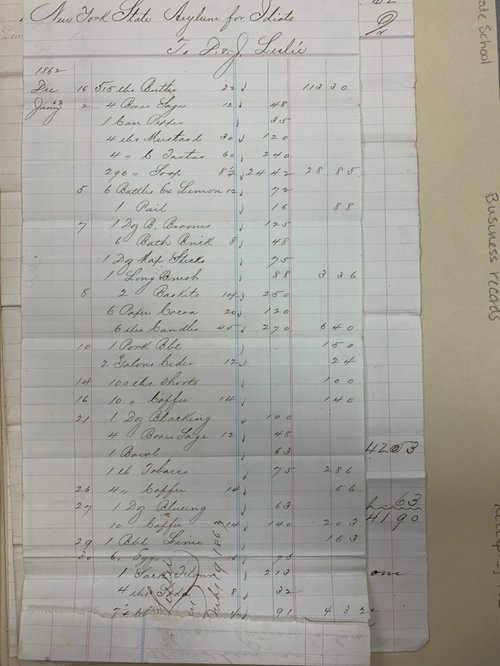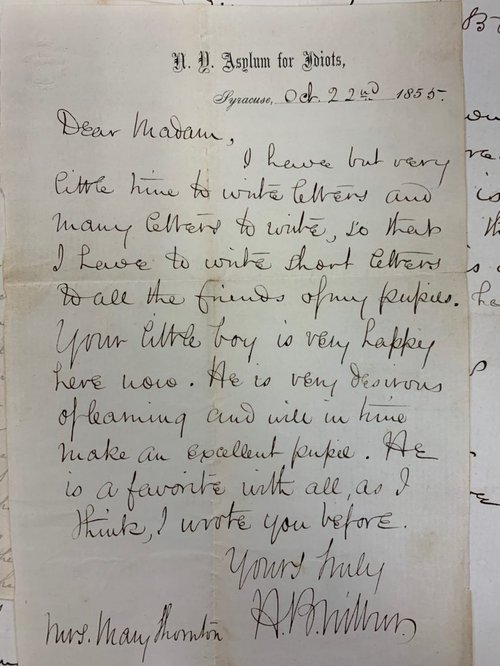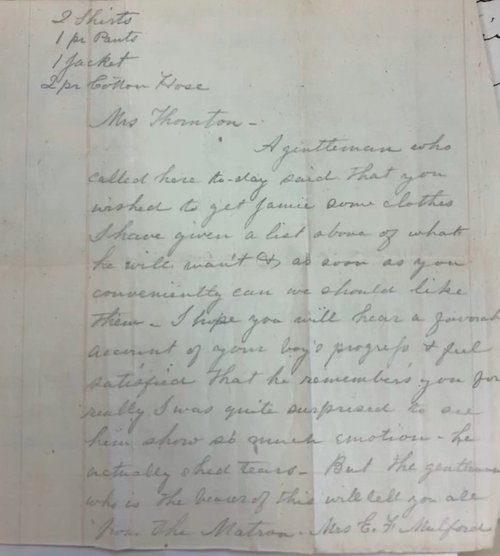James Thornton and The Syracuse State School

By Aisha Pierre, Reference Assistant
As students in the museum studies program, we are trained daily to recognize how to handle any object in a museum collection. Watching us examine how to pick up an object makes me think of those robots in car factories, constantly swiveling their heads. When I began working at SCRC, I was interested in gaining some background knowledge in archives, and I will admit I was a little overwhelmed. The complete size of Syracuse University’s holdings are incredible. Every day, I get to learn more about our collections through our numerous patrons that visit the sixth floor.
During one of my shifts, a patron had requested the Syracuse State School Collection and I was excited to see the contents. I am originally from Rhode Island (yes, it is a state) where, as an undergrad, I learned and wrote about State Schools and Asylums every semester. A State School is a facility that cares for mentally disabled children and, in some cases, adults. In 1851, The New York State Asylum for Idiots was founded in Albany, New York and cared for almost 300 students. In 1855, the school moved to Syracuse and went through several name changes. First known as the Syracuse Idiot Asylum, then the Syracuse State Institution for Feeble-Minded Children, the Syracuse State School for Mental Defectives, and finally, the Syracuse State School. The Syracuse State School records are in a small thin box, which contains approximately ten folders, labeled as either receipts or business records. The receipts are a record of the school's purchases and to me, the receipts demonstrated care by the school's director, Hervey Wilber, through purchases of winter coats and boots for the Syracuse winter. The school spent money on high-end food options such as salmon, lamb and mackerel.

A school receipt including entries for bacon, pork, and cider.
I was delighted to discover that SCRC also had a collection from a student of the school. James Thornton was a student at the Syracuse State School from 1855 until 1862. According to his collection, he was placed into their care because he was “deaf and dumb.” The collection is a series of letters from the school to his mother, Mary Thornton. The letters are written by Director Hervey B. Wilbur or other members of staff. Here is an excerpt from a letter from Hervey B. Wilbur sent in 1855:
“Your little boy continues well – he is perfectly happy in his new home and getting on nicely in school matters. He is an affectionate little fellow and all the teachers and attendants are quite attached to him. I hope that you feel quite easy about him for he seems healthy and he is much more in the way of improvements here than he could possibly be at home.”
When I first read these letters, they seemed sincere, but the more I read, the more I noticed the use of similar phrasing. Almost every letter referred to James as an “affectionate little boy” who “seemed well and happy.” I recalled the Willowbrook State School in Staten Island who used their patients from the 1950s until the 1970s for hepatitis experiments unbeknownst to the parents. I wondered if the Syracuse State School was not being as truthful concerning James’ well-being and the care he was receiving from the school as the letters indicated at first glance. Was Mary ever concerned towards her sons care while reading these letters? Did she also notice the repetitive phrases?

Letter from Director Hervey B. Wilbur to Mary Thornton (1855)

Undated letter from E.F. Malford
One of the undated letters written by E.F. Malford, a member of the school's staff, states, “[we were] satisfied that he remembers [her] for really I was quite surprised to see him show so much emotion- he actually shed tears.” My initial interpretation of this was James was seen often as a happy boy with a smile on his face. However, when I read the letter again, considering the underdeveloped understanding of mental heath at this time, as well as how the school went through several name changes from the Feeble-minded to the Idiot School, it made me question how staff members might have really viewed James.
Do these letters and receipts show the full care offered to the children? These records are important because they provide an opportunity to piece together an individual's experience, in this case, James Thornton's. His letters open up the question of well-being on an institutional level. If you come to SCRC and pull these records, you will see the purchases made by Hervey Wilbur for the students of the school and the letters written about James Thornton's experience at the school. These letters and records will continue to be reviewed by researchers who have their own opinions on the records and the type of care offered to children by the Syracuse State School.
The Syracuse State School Collection (Syracuse State School Collection, Special Collections Research Center, Syracuse University Libraries) and James Thornton Correspondence (James Thornton Correspondence, Special Collections Research Center, Syracuse University Libraries) are part of the Special Collections Research Center’s manuscript collections.
Additional Sources:
“Diet Table.” Dexter Donation and Dexter Asylum of the City of Providence, Providence Press Company, 1879, pp. 72–73.
Gunderman, Dan. “Revisiting the Atrocities That Once Consumed the Halls of Willowbrook State School in Staten Island – WARNING GRAPHIC CONTENT.” Nydailynews.com, New York Daily News, 8 Apr. 2018, www.nydailynews.com/news/national/atrocities-consumed-halls-willowbrook-school-article-1.3030716
“The State Idiot Asylum.” The New York Times, 19 May 1855, timesmachine.nytimes.com/timesmachine/1855/05/19/87575288.pdf
Special thank you to Shaina “Shay” Weintraub at the Providence City Archives, Providence, R.I. for helping me with research and being a great friend.
